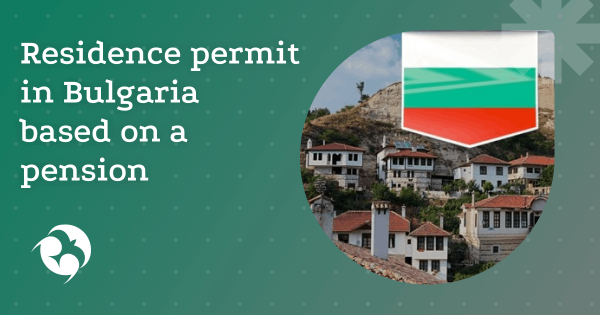In 2025, Bulgaria opened up new opportunities for Russian retirees, effectively becoming a gateway to Europe. The statistics speak for themselves – more than 35,000 of our compatriots have already chosen the Republic as their home. Moreover, approximately half of Bulgarian real estate buyers are of retirement age.
Bulgarian legislation provides pensioners with a simplified path to obtaining a residence permit. The key requirement remains a pension of at least 32,000 rubles per month and savings of at least €6,700 in a Bulgarian bank account.
The application process remains a two-stage process: first, a Category D visa is obtained at the consulate, then a residence permit is issued directly in Bulgaria. After five years, permanent residency becomes available, and after another five, Bulgarian citizenship becomes possible.

- We will answer all your questions
- We will help you choose the best option
- We will guide you through every step or do everything for you
Conditions for Granting and Requirements for Applicants
Bulgarian authorities have developed a rather pragmatic system for assessing immigrant pensioners. The key factor is the applicant’s ability to financially support themselves without burdening the local budget.
Bulgarian immigration legislation recognizes three categories of pensioners. The first is the classic retirement age. The second covers military personnel, police officers, and other categories who have received a pension based on length of service. The third includes people with any disability. The age of the applicant is irrelevant. A 35-year-old military pensioner has the same rights as a 70-year-old. The recipient’s status in their country of origin is important.
Additional Requirements and Restrictions
Applicants must not be members of organizations whose activities are prohibited in Bulgaria. An outstanding criminal record automatically disqualifies them from obtaining residence status. Family members (spouses and minor children) are eligible for a residence permit through the family reunification program. In this case, financial requirements are not set separately, but the main applicant must demonstrate their ability to support all family members. In practice, it is recommended to demonstrate 100% of the required amount for a spouse and at least 50% for a minor child. Health insurance requires special attention. The policy must be valid throughout Europe.
Provision Period
The first residence permit for pensioners is issued for a strictly 12-month period. This serves as a trial period during which the authorities assess the realism of the immigrant’s intentions. This caution is understandable: too many applicants view Bulgaria merely as a transit point for subsequent relocation to wealthier European countries.
The wait for a decision ranges from 30 to 60 days. The standard application processing time is 1.5 months. This fluctuation depends on the workload of the specific regional migration service office and the seasonality of applications.
The renewal process is repeated every 12 months for 5 years. Documents must be submitted strictly two weeks before the expiration of the current status. Even a day late can result in deportation and the need to start the process from scratch from outside the country. Renewal requires proof of basic requirements: sufficient funds in the account, current health insurance, and a valid housing contract. Essentially, each year the retiree must re-prove their financial solvency.
Advantages of Retiring to Bulgaria
- Minimal tax liabilities. The 10% income tax rate is significantly different from that in Russia and most European countries.
- Affordable cost of living.
- Government benefits for pensioners include subsidies for utilities and free public transportation.
- Environmentally friendly regional centers.
- Affordable housing prices.
- No property tax for properties valued at less than BGN 300,000.
- Simplified residence permit procedure specifically for pensioners.
- A fast path to European citizenship.
- Visa-free travel within the Schengen area.
How can I transfer my pension to Bulgaria?
Until 2025, a well-established mechanism based on an intergovernmental agreement was in effect. 2009, but the sanctions policy has disrupted the usual arrangements. Now, pensioners are forced to seek alternative ways to receive funds, often associated with financial losses.
The social security agreement between Russia and Bulgaria formally remains in effect. Each country pays pensions for work experience acquired in its territory. Russian citizens who worked in the USSR and Russia have the legal right to receive a Russian pension, regardless of their place of residence. According to the international agreement, the assigned Russian pension continues to be paid, at the pensioner’s discretion, in either Russia or Bulgaria.
However, since August 2025, Bulgarian authorities have stopped accepting transfers of Russian pensions. The Russian Social Fund has sent official requests to Bulgarian pension authorities, but approval remains uncertain. More than 308,000 Russian citizens worldwide receive pensions through international transfers, but Bulgaria is among the three countries that have completely blocked these transfers.
Pensioners are forced to turn to currency exchange offices and private translators. Some pensioners transfer funds through relatives in third countries or use cryptocurrency platforms. These schemes require technical knowledge and are associated with additional risks, including possible violations of currency regulations.
Required Documents
- International passport. Its validity must exceed the requested visa by at least 18 months. Copies of all pages containing stamps, visas, and other stamps are required.
- Russian internal passport. Copies of all pages containing stamps.
- Color matte photographs on a white background.
- Pension certificate. Original and notarized copy.
- A certificate from the Pension Fund of the Russian Federation (PFR) showing a pension of at least 32,000 rubles for the last 90 days, with a certified digital signature.
- A bank statement showing an amount of at least €6,700 per year.
- Residential documents in Bulgaria. A lease agreement for at least one year or a title deed.
- Health insurance with coverage of at least €30,000 for six months.
- A certificate of no criminal record with an apostille, no older than 6 months.
Practice shows growing demands for apostilled documents. Although formally not required, Bulgarian officials are increasingly insisting on apostilles, especially for certificates of no criminal record and PFR documents.
Step-by-step instructions
Resolving housing issues. A residential address in Bulgaria must be secured before applying for a D visa.
- Opening a bank account. An account with a Bulgarian bank with a deposit is required.
- Collecting and legalizing documents. Preparation includes obtaining a certificate of good conduct, a pension certificate, and pension fund statements on the amount of your pension.
- Submitting an application for a D visa. Documents are submitted in person at the Bulgarian consulate. It is important to remember that all family members, including children, must be present.
- Obtaining a D visa and entering Bulgaria. A category D visa is valid for 180 days and allows a single entry to obtain a residence permit.
- After crossing the border, the applicant has exactly three days to register at the local police station at their address.
- Submitting documents for a residence permit to the Ministry of Internal Affairs. You can apply to the Immigration Department of the Ministry of Internal Affairs without an appointment. The application must be completed strictly in Bulgarian using the prescribed form.
- Obtaining a residence permit card. The standard processing time is 30 days. For an additional fee, you can obtain a card in an expedited mode.
Processing Cost
Total costs start at €2,000 excluding housing, making this program one of the most affordable in Europe. Consular and administrative fees make up the base cost. A Category D visa costs €100. A residence permit application costs 10 leva (approximately €5).
Standard processing of a plastic residence permit card costs €22 per month, expedited processing costs €45 in 10 days, and an express processing cost of €110 in 3 days. Document legalization is a significant expense. A complete set of documents for a pensioner typically requires translation of 8-12 pages, amounting to 8,000-15,000 rubles. Consular legalization adds €15 per document. Apostilling Russian documents costs approximately 2,500 rubles per document, subject to standard processing times.
What to do in case of refusal
Residence permit denials for pensioners are less common than for other reasons, but such situations require a clear understanding of the next steps. The main reasons for negative decisions include:
- Inaccuracy of the information provided.
- Incorrectly completed Pension Fund certificates, lack of an apostille on criminal records, or incorrect translations.
Bulgarian law provides 14 calendar days to appeal a negative decision. The countdown begins from the moment the written notification of refusal is received. Failure to comply with this deadline forfeits the right to appeal in court and leaves only the option of resubmitting the documents.
Comprehensive support for relocating to Bulgaria
Relocating during retirement requires a professional approach. Up to a quarter of applicants who apply independently face refusals. Expert support, however, reduces this rate to a minimum. The difference is critical, especially considering age restrictions and the complexities of re-applying for visas.
Our company’s specialists eliminate key obstacles to retirement immigration. We monitor every document during preparation, eliminating technical errors. A preliminary document review is a service that pays for itself the first time you submit your application. Saving time is especially important for retirees planning to move during specific seasons. Request a consultation with an expert. We will analyze your situation and offer the best options in terms of cost and timeframe.












